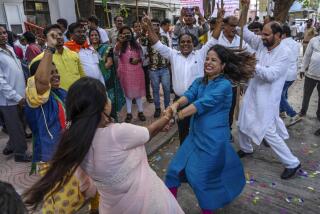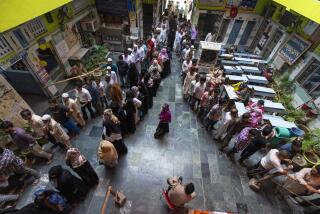Communist-Led Coalitions Appear Headed for Victory in 2 India State Elections
- Share via
NEW DELHI — The Communist-led coalitions in the two “Red forts” of India--West Bengal and Kerala states--appeared headed for victory in state elections as counting continued Tuesday.
Meanwhile, the ruling Congress-I Party of Prime Minister Rajiv Gandhi salvaged some prestige by joining with a Kashmir regional party to rout foes, including a vociferous Muslim fundamentalist movement, in strategic Jammu and Kashmir state.
The biggest disappointment for Gandhi’s party came in the southern state of Kerala, where the Gandhi-backed United Democratic Front, which had ruled in that progressive 26-million-population state since 1982, was soundly defeated by the leftist Democratic Front coalition, headed by the Communist Party of India-Marxist. The coalition gained a clear majority in the 140-member state assembly.
Volatile Politics
However, the result cannot be called much of a surprise in the volatile world of Kerala politics, where more than 25 political parties--ranging from fundamentalist Christians to Trotskyite Marxists--claim members. Since 1957, when Kerala became the first state in the world to freely elect a Communist government, there have been 13 changes in leadership and leftist coalitions have been voted in and out of government six times.
In populous West Bengal state, meanwhile, the Communist Party-led Left Front government of Chief Minister Jyoti Basu demonstrated its stability and popularity by becoming the first opposition coalition to defeat the ruling Congress Party for the third consecutive time in a state election.
The result in West Bengal, where the 73-year-old Communist statesman Basu remains enormously popular, was expected. However, Gandhi campaigned vigorously for his party before huge crowds in the state, which has 55 million people and stretches from the 28,000-foot Mt. Kanchenjunga in the Himalayas to the Ganges River delta and Calcutta.
Closely Watched Poll
As a result, Indian political scientists are examining the still-incomplete West Bengal vote count to determine how much Gandhi’s personal popularity translates into support for his party at the state level.
“The question was not whether Congress would win the West Bengal election,” said Indian political pollster Pranoy Roy, “but rather how much it could improve its position.”
With a little more than half the results from the 294 state assembly districts in West Bengal reported Tuesday night, Congress appeared to have lost four positions to the ruling Left Front.
Since sweeping into power with a commanding majority of the national Parliament in elections held after the assassination of his mother, Indira Gandhi, in 1984, Rajiv Gandhi has witnessed a steady erosion of his party’s strength at the state level.
Sympathy Factor Diminished
For example, his Congress Party took all 13 of the national parliamentary seats for which it entered candidates in Kerala in 1984 and made a serious dent in the national representation from West Bengal. However, 2 1/2 years later, it appears that the sympathy vote that propelled Rajiv Gandhi into power with a four-fifths majority in the national Parliament, the Lok Sabha, has diminished.
In elections held since December, 1984, Gandhi’s party has lost in Karnataka, Andhra Pradesh, Punjab, Assam and, most recently, the tiny state of Mizoram.
It has been noted, however, that the elections in Punjab, Assam and Mizoram followed agreements reached between the Gandhi government and rebel groups in each state. Therefore, some political analysts here contend, the Gandhi government was partly victorious because the states were brought back into democratic rule.
Likewise, the Congress Party victory in Jammu and Kashmir on Monday, as part of a two-party coalition against Muslim fundamentalist and Hindu fundamentalist parties, was a victory for Gandhi’s policies, if not his party.
Congress will be the junior partner in the state coalition, headed by the secularist National Conference and its leader, Dr. Farooq Abdullah, son of the famed “Lion of Kashmir,” Sheik Mohammed Abdullah. However, Abdullah, a progressive Muslim physician, is a personal friend of Gandhi and, more important, an avowed secularist.
More to Read
Sign up for Essential California
The most important California stories and recommendations in your inbox every morning.
You may occasionally receive promotional content from the Los Angeles Times.













